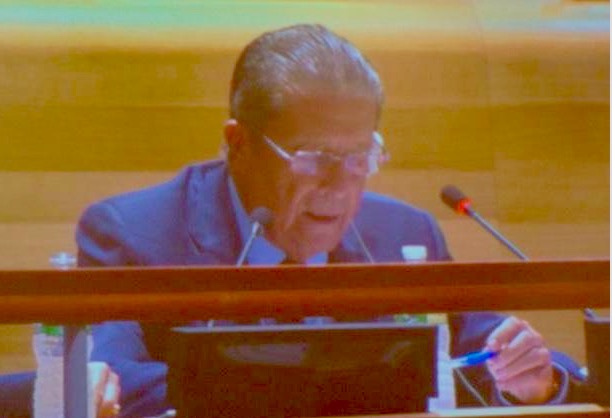FREE FLOW OF INFORMATION
Speech by Federico Mayor at UN High Level Forum on the Culture of Peace
After the impressive Plenary Segment of this morning and afternoon; after the rich debate of this excellent Panel, I consider that to put into practice the culture of peace and non-violence, we must

Photo of Federico Mayor speaking at Forum by Bircan Unver, GMCOP
1.- have particularly in mind:
– the Programme of Action of the Resolution of the GA of 13 September 1999.
– the GA Resolution of 16 December, 2016 – Follow-up.
– the GA Resolution of 11 December, 2017 – Follow-up, as well, both of them agreed by very important number of countries. And very populated ones, as China, India, …
2.- The General Assembly has highlighted in these Resolutions, as well as in the UN High Level Forums since 2012, the necessity –more important now than ever because of the potentially irreversible processes, socially and environmentally – of the effective implementation of the culture of peace. Tomorrow can be late.
3.- Many thanks, dear Ambassador Chowdhury, for your tirelessly efforts in favour of a culture of peace and non-violence. It is completely inacceptable that every day thousands of human beings die of hunger and extreme poverty, while more than 4 billion dollars are invested in armament and military expenditures.
(continued in right column)
What is the United Nations doing for a culture of peace?
(continued from left column)
4.- I must emphasize the relevance of the culture of peace right now, when we see again supremacism, fanaticism, racism… being widespread without an immediate reaction. Have we forgotten what happened because of the exclusion and discrimination of nazism, fascism and Japanese imperial policies, leading to the II World War?
5.- A new concept of security must be adopted, in the context of an efficient reinforcement of the crucial role of the UN System, with the complete elimination of the oligarchic and plutocratic groups (G7, G8, G20), main responsibles of the present lack of multilateral democratic governance in the world.
6.- In the new era, it is urgent the transition from a culture of domination, violence and war to a culture of encounter, dialogue, conciliation, alliance and peace. From force to word, from “para bellum” in the well known dictum “Si vis pacem, para bellum” to “para verbum”, starting with ourselves, with our every day behaviour.
7.- We had today here the leading example of Rigoberta Menchú, Nobel Peace Prize 1992. She knows well the immense and in depth terrible impact of violence and she has given us with her life the best reference of the new ways to overcome hate and aggression… and to share and live together, all different but all united. Her speech this morning has been extremely lucid and courageous. Every dawn we must take it into account.
8.- We have today here as well the Rector of UPEACE, Prof. Francisco Rojas. I wish to thank him for all he is doing to mobilize the academic and scientific communities in favour of a culture of peace. The Earth Charter is one of the main pillars of action of UPEACE.
Dear President, ladies and gentlemen: the first phrase of the UN Charter –“We, the peoples”- was premature in 1945. The human beings were being born, living and dying in some square kilometres. And they were silent, obedient and fearful. But now, “the peoples” know what happens around the world, can express themselves freely and, above all, they are men and women. Now they become world citizens and must be mobilized for the urgent transition from force to word. Now, for the first time in history “the peoples” can take in their hands the reins of the humanity common destiny, and ensure sustainable peace worldwide.